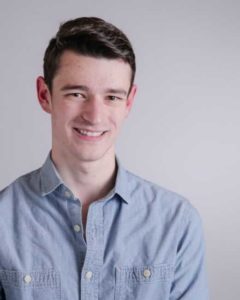 Alright, so quick introduction, I’m Tate Clemen. Currently, I’m pursuing a B.S.B.A in Accounting and Finance and a B.A. in Theatre, and I’m originally from the Kansas City area.
Alright, so quick introduction, I’m Tate Clemen. Currently, I’m pursuing a B.S.B.A in Accounting and Finance and a B.A. in Theatre, and I’m originally from the Kansas City area.
So, last year as I was making my second round of visits to Drake, I was talking with my admissions counselor, Evan, and we were discussing different scholarships that Drake offered. The Engaged Citizen Corps (ECC) came up, and, being so involved in service, I thought I’d look into it a little more. I ended up applying and got an interview with Amanda. In the car, on the way home from my third and final visit to Drake, I got the email that I had been accepted. That was one of the things that helped to secure the deal for me.
At the beginning of the year, we started the first part of the in-class section of the programs with FYS 024, “The Common Good,” which consisted of only the nine members of the ECC. This class was centered around Robert Lupton’s book Toxic Charity. Lupton’s book is a critique of the charitable industry, and shows the need for organizations that eliminate dependency and are sustainable. The ideas of his book had always been in the back of my head, but once put in words and examples, it was easy to see he was right. But this knowledge especially helped when transferring it to our worksite.
After a short “speed-dating” style of interviews with each partner site, I was paired with the Des Moines Music Coalition (DMMC). The DMMC is a Des Moines based non-profit whose main goal is to turn Des Moines into a “music city” through education and various advocacy projects. Their most known project is the implementation of the 80/35 Music Festival every July.
Going into the internship I had virtually no expectations, because I knew that it wouldn’t matter what work I was doing as long as I had the passion for cause, which I found with the DMMC. I soon discovered that I would be working as a Digital Marketing and Communications intern, working on various projects around the office, everything from designing and producing a new website to reorganizing our storage unit. The Music Coalition is quite a bit different than the other organizations the ECC works with, because they do not necessarily deal with what one would usually see as a “social problem” like poverty or homelessness, but instead the untapped potential of the Des Moines music and art scene. When people think of Des Moines, their minds usually don’t go straight to music, as it might with Nashville or New York. Due to this mission, my work with the Des Moines Music Coalition has helped me integrate myself into the Des Moines community, and further my understanding of the art scene in the city, and the struggles that it holds.
In my time with the DMMC, it has become very apparent that the government within Des Moines is limiting the growth of the scene. This is currently an ordinance within the city limits that dictate that if a music venue’s revenue is over 50% alcohol sales, then anyone under 21 is not allowed in after 9pm. This highly limits smaller venues like Lefty’s or the Vaudeville Mews from fulfilling their potential. A majority of Drake’s population is under 21, and with Lefty’s being within walking distance from campus, there is a huge market that cannot be tapped due to Des Moines’ ordinance. It was important to first understand what was happening within the music scene, and then I was able to see the DMMC’s vision and mission.
One of the largest projects that I’ve worked on is the Music Coalition’s new website. Jarin, the executive director, wanted to completely overhaul the old website and wanted something that resonated more with our target market. The old website read as “a nonprofit website,” and we wanted to cater to where a majority of the DMMC’s patrons reside, in the younger, millennial generation. We wanted to represent a feeling and an idea, a feeling of fun and of what we are truly about.
This experience has really helped me to get a greater grasp of the Des Moines community, and the need for the presence of art in the form of music within the city. It has also given me the opportunity of seeing the inner workings of how a nonprofit works. Almost all of my prior experience with the nonprofit industry was on the front lines, what is referred to as “direct service,” what people would usually think of when talking about volunteer work. But very seldom do people get to see the behind the scenes of an organization. This program has helped me apply what I’m learning in class to “the real world,” and helped expand my views of the world and the nonprofit industry.
“Art is the only serious thing in the world. And the artist is the only person who is never serious.”
― Oscar Wilde
Written by: Tate Clemen
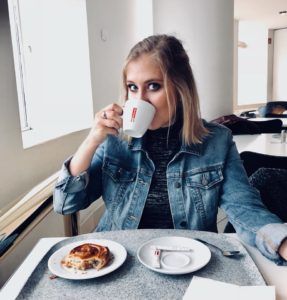 Hi! I’m Emily Larson. I’m the Service Learning Ambassador for IRIS, the Iowa Radio Reading Information Service. I’m a sophomore News, Magazine, and Writing major. As a student in the J54 class, I read for IRIS. I loved the impact such a simple service was having on the community. Reading the news for the blind and print handicapped helps people all over Iowa. And all I had to do was go to the basement of Meredith Hall and read the Council Bluff’s Daily Nonpareil! The first time I read I was super nervous. I figured I’d mess up and ruin the news for all those people. But with the help of the SLA who trained me, I read for an hour and enjoyed it. The worst part was that I forgot a water bottle and my voice was pretty sore afterwards. Now, when I train students, I always tell them to bring water—it’s a lot of reading after all. Students from the J54 class read for IRIS as a requirement of the course, but I like to make it more than that. Service isn’t about what you’re getting, a grade, it’s about what you’re giving. I try to stress that during trainings. In the booth, I tried to spice things up with a couple posters. One of them is a “5 W’s of IRIS” poster that reminds students of why they’re doing what they’re doing and who it’s for, and a whole lot of sparkle. The other one is a “reflection” poster. After they’re done reading, students can take a popsicle stick and draw a little face on it and put it on an outline of Iowa, representing someone in Iowa they’ve helped that day. It’s cheesy, but I think little things like the posters and upbeat training sessions remind the students that what they’re doing is important. They’re not just reading into a microphone in a booth in the basement, they’re actually helping real people.
Hi! I’m Emily Larson. I’m the Service Learning Ambassador for IRIS, the Iowa Radio Reading Information Service. I’m a sophomore News, Magazine, and Writing major. As a student in the J54 class, I read for IRIS. I loved the impact such a simple service was having on the community. Reading the news for the blind and print handicapped helps people all over Iowa. And all I had to do was go to the basement of Meredith Hall and read the Council Bluff’s Daily Nonpareil! The first time I read I was super nervous. I figured I’d mess up and ruin the news for all those people. But with the help of the SLA who trained me, I read for an hour and enjoyed it. The worst part was that I forgot a water bottle and my voice was pretty sore afterwards. Now, when I train students, I always tell them to bring water—it’s a lot of reading after all. Students from the J54 class read for IRIS as a requirement of the course, but I like to make it more than that. Service isn’t about what you’re getting, a grade, it’s about what you’re giving. I try to stress that during trainings. In the booth, I tried to spice things up with a couple posters. One of them is a “5 W’s of IRIS” poster that reminds students of why they’re doing what they’re doing and who it’s for, and a whole lot of sparkle. The other one is a “reflection” poster. After they’re done reading, students can take a popsicle stick and draw a little face on it and put it on an outline of Iowa, representing someone in Iowa they’ve helped that day. It’s cheesy, but I think little things like the posters and upbeat training sessions remind the students that what they’re doing is important. They’re not just reading into a microphone in a booth in the basement, they’re actually helping real people.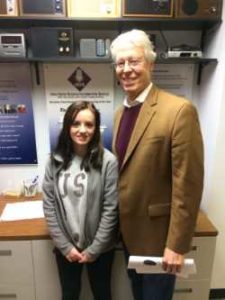
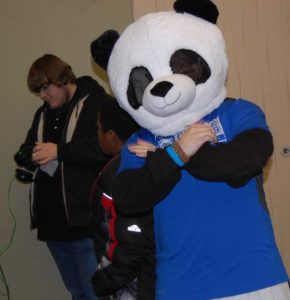 What is randomness? We all have some preconceived notion for what it means, but how does one describe it mathematically? The purpose of this J-Term (The Many Faces of Randomness) was to look at a few uses for concept of randomness, and determining what, if anything unifies them. We started out by analyzing card games, dice rolls, and coin flips. We then moved on to discussing some of the common perceptions and fallacies regarding randomness. These fallacies usually arise when people attempt to find patterns in random sequences. They range from the semi-rational “hot hand fallacy” (when a player of a particular sport seemingly increases their odds for making a shot based on their previous shots that game), to the almost entirely irrational “gamblers fallacy” (when a person is playing a game of chance and determines that, due to previous failures, they are due for a win). After touching on these topics, we moved deeper into the mathematics behind randomness. We discussed many concepts including entropy, determinism, random number generators, Kolmogorov complexity, and much more. So, I think it is safe to say that we didn’t spend the entire time drawing cards and flipping coins.
What is randomness? We all have some preconceived notion for what it means, but how does one describe it mathematically? The purpose of this J-Term (The Many Faces of Randomness) was to look at a few uses for concept of randomness, and determining what, if anything unifies them. We started out by analyzing card games, dice rolls, and coin flips. We then moved on to discussing some of the common perceptions and fallacies regarding randomness. These fallacies usually arise when people attempt to find patterns in random sequences. They range from the semi-rational “hot hand fallacy” (when a player of a particular sport seemingly increases their odds for making a shot based on their previous shots that game), to the almost entirely irrational “gamblers fallacy” (when a person is playing a game of chance and determines that, due to previous failures, they are due for a win). After touching on these topics, we moved deeper into the mathematics behind randomness. We discussed many concepts including entropy, determinism, random number generators, Kolmogorov complexity, and much more. So, I think it is safe to say that we didn’t spend the entire time drawing cards and flipping coins.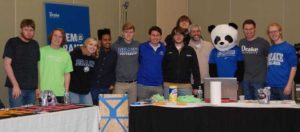
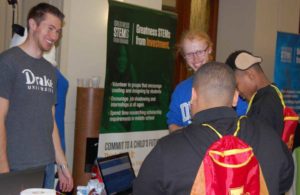
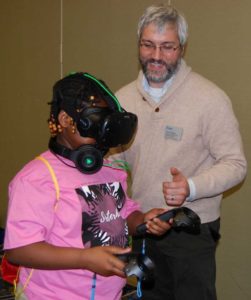
 As an Engaged Citizen Member, I have been paired with Iowa Homeless Youth Centers (IHYC), a non-profit that works to end the cycle of homeless and promote independence through assistance and support. IHYC works primarily with the ages of 16-22 with direct assistance in the areas of education, employment, safe housing, positive community engagement, and life skills. There are several programs instilled at IHYC in order to achieve the youth’s goals within the said areas including the Youth Opportunity Center, Post-Secondary Education Retention Program (aka PSERP), counseling, Street Outreach, and Emergency Beds. The Youth Opportunity Center is a safe-space where youth can have a warm meal, use computers, socialize with others, and relax. Meanwhile, PSERP works closely with the youth as a form of support while achieving a higher education. Several of the youth utilize the counselor, while even more participate in Street Outreach, a program in which every other weekend, members and volunteers of IHYC bring survival packs to people experiencing homeless. Finally, the Emergency Beds are available for up to 10 youth, in which they can reside for a short amount of time while they work with IHYC’s staff to figure out their next steps. Needless to say, IHYC is dedicated to helping the youth reach a level of self-sufficiency.
As an Engaged Citizen Member, I have been paired with Iowa Homeless Youth Centers (IHYC), a non-profit that works to end the cycle of homeless and promote independence through assistance and support. IHYC works primarily with the ages of 16-22 with direct assistance in the areas of education, employment, safe housing, positive community engagement, and life skills. There are several programs instilled at IHYC in order to achieve the youth’s goals within the said areas including the Youth Opportunity Center, Post-Secondary Education Retention Program (aka PSERP), counseling, Street Outreach, and Emergency Beds. The Youth Opportunity Center is a safe-space where youth can have a warm meal, use computers, socialize with others, and relax. Meanwhile, PSERP works closely with the youth as a form of support while achieving a higher education. Several of the youth utilize the counselor, while even more participate in Street Outreach, a program in which every other weekend, members and volunteers of IHYC bring survival packs to people experiencing homeless. Finally, the Emergency Beds are available for up to 10 youth, in which they can reside for a short amount of time while they work with IHYC’s staff to figure out their next steps. Needless to say, IHYC is dedicated to helping the youth reach a level of self-sufficiency.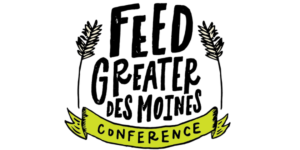
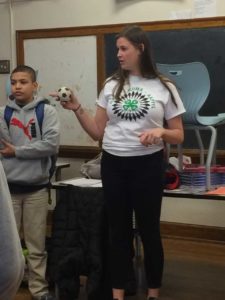 During my time so far at 4-H, I have had the opportunity to work with multiple afterschool programs in Des Moines including Hillis Elementary, Harding Middle School, and Callanan Middle School. I am so blessed to be able to work with such a diverse amount of kids coming from all types of backgrounds. This has helped increase my awareness and ability to work in situations that aren’t necessarily in my comfort zone. I am grateful to be able to work in such an inclusive community. In addition to working with a number of schools I had the opportunity to participate in the 4-H Ujima Retreat at the beginning of my service, which was an awesome experience where African/African American and Asian/Asian-Pacific Islander students were exposed to what higher education is and the doors it could open. I plan to do a lot more during my time with 4-H, including more afterschool programs, retreats, and creating a joint service project with a few Drake organizations such the APO Service Fraternity and Hillis Elementary.
During my time so far at 4-H, I have had the opportunity to work with multiple afterschool programs in Des Moines including Hillis Elementary, Harding Middle School, and Callanan Middle School. I am so blessed to be able to work with such a diverse amount of kids coming from all types of backgrounds. This has helped increase my awareness and ability to work in situations that aren’t necessarily in my comfort zone. I am grateful to be able to work in such an inclusive community. In addition to working with a number of schools I had the opportunity to participate in the 4-H Ujima Retreat at the beginning of my service, which was an awesome experience where African/African American and Asian/Asian-Pacific Islander students were exposed to what higher education is and the doors it could open. I plan to do a lot more during my time with 4-H, including more afterschool programs, retreats, and creating a joint service project with a few Drake organizations such the APO Service Fraternity and Hillis Elementary.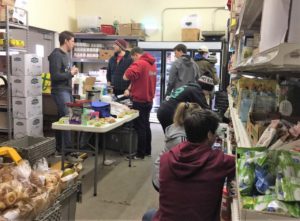
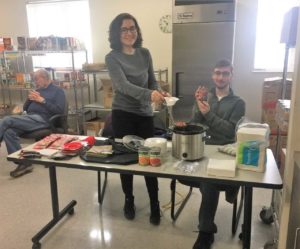
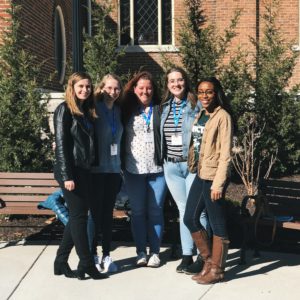
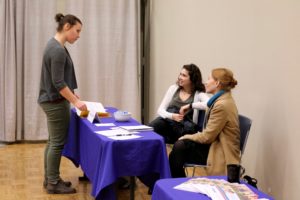 These “livelihoods” that I describe are often wrongly stereotyped especially within Anawim’s tenant basis. Though these people may be experiencing drug addictions, alcoholism, single parenthood, etc., they are not lazy, helpless scum. They are just people who have been bogged down by society’s unequal distribution of resources. With a deepening gap between the haves and the have nots, they feel the inescapable burden the most. Non-profits like Anawim are designed to provide opportunities to those who might not otherwise get the chance. But, it is important to note, that even Anawim’s programs do not extend to everyone. These man-made boundaries put people at risk for an on-going cycle of self-hatred and frustration. I regret to say that it is this that results in giving up. In doing so, people experiencing homelessness accept the wrongly attributed labels and become what they are described. This is not their fault. It is ours – for not speaking up or changing our language (one of the most powerful tools we have).
These “livelihoods” that I describe are often wrongly stereotyped especially within Anawim’s tenant basis. Though these people may be experiencing drug addictions, alcoholism, single parenthood, etc., they are not lazy, helpless scum. They are just people who have been bogged down by society’s unequal distribution of resources. With a deepening gap between the haves and the have nots, they feel the inescapable burden the most. Non-profits like Anawim are designed to provide opportunities to those who might not otherwise get the chance. But, it is important to note, that even Anawim’s programs do not extend to everyone. These man-made boundaries put people at risk for an on-going cycle of self-hatred and frustration. I regret to say that it is this that results in giving up. In doing so, people experiencing homelessness accept the wrongly attributed labels and become what they are described. This is not their fault. It is ours – for not speaking up or changing our language (one of the most powerful tools we have).